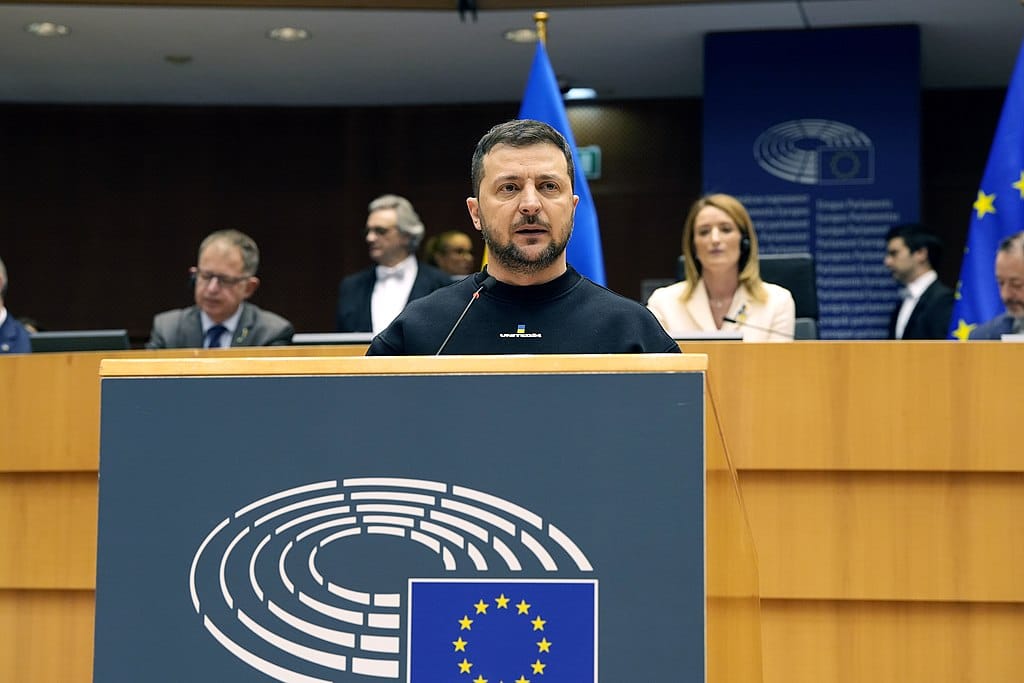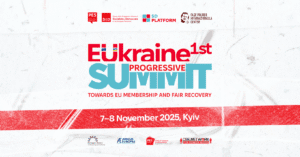Ukrainian President Zelensky speaks in the EU Parliament, March 2022 (source: Wikimedia Commons)
Eyes in Ukraine, Moldova and Georgia are on Brussels this week, as the European Commission will publish a recommendation on EU candidacy status for these countries. It will be a first, important step towards EU candidate status – which will be further discussed between European leaders in a 23-24 June summit in Brussels. What to expect?
Von der Leyen’s surprise visit to Ukraine
The European Commission seems willing to grant candidate EU status to Ukraine, after various meetings of EC President Ursula von der Leyen with Ukrainian President Zelensky. Ukraine officially applied to the EU at the end of February, shortly after Russia commenced its full-fledged invasion of its neighbor. Von der Leyen has repeatedly said that Ukraine deserves a place “in the European family”.
On June 11, she made a surprise visit to Kyiv, sending positive signals at a press conference. “You have done a lot in strengthening the rule of law, but there is still a need for reforms to be implemented, to fight corruption, for example,” von der Leyen said. Diplomatic sources have already said to Bloomberg that the Commission will grant a positive recommendation for Ukraine on June 17, and that the upcoming 23-24 June EU summit will provide the next major hurdle.
Georgia and Moldova
For longer, Georgia is considering applying for EU membership. The current governing party ‘Georgian Dream’ has made 2024 membership application an election promise – events in Ukraine have only accelerated proceedings. The Tbilisi government officially applied in March for EU membership. However, Georgia’s outlook seems troublesome. Recently, the Georgian government has cracked down on independent media and anticipated judicial reforms have stalled. On June 9, the EU parliament passed a resolution on the worsening media freedom, and called for sanctions on the influential former PM Bidzina Ivanishvili for alleged Kremlin-ties. The multi-billionaire still has an immense influence over Georgian politics – this all does not bid well for the Georgian EU candidacy prospect. While the EU Parliament appeals for a Ukraine and Moldova candidacy status, it says that Georgia ‘needs work towards granting the same status.”
Is the situation more positive for Moldova? Moldova also applied in March after the invasion of Ukraine. It currently has a pro-EU government under president Maia Sandu, who described EU candidacy status as a “light at the end of the tunnel” for the country, heavily hit by the war. Moldova has cherished pro-EU ambitions longer – ever since pro-democratic protests in 2009 swept the country. Pro-Russian forces remain powerful in the country, especially in the eastern separatist region of Transnistria. This has been an important force of destabilization and insecurity for Moldova.
The country of 2,5 million inhabitants is an important humanitarian partner for western institutions. Half a million refugees entered since February, of which 100,000 are still residing in Moldova. For now, it seems that the Sandu-government can expect a positive recommendation from the EC on June 17.
The EU Summit
At the EU Summit, all twenty-seven EU member states must agree with granting a candidate status. As ever, member states’ positions differ significantly and a long negotiation process lies ahead to align them all towards a unitary EU policy.
A major concern seems the possibility of a “fast-track candidacy” for Ukraine, Moldova and Georgia – as it would prefer them over other applicants. Turning candidacy status into actual membership requests extensive monetary, judicial and political reform – a process that could take decades. Various Western Balkan countries have been candidate members since the mid-2000s – it would spark outrage in North Macedonia, Albania, Montenegro, Serbia and Bosnia & Herzegovina if other countries would be given a special procedure.
Especially the Netherlands and Denmark have expressed their concerns regarding the fulfilment of the strict criteria of EU membership for Ukraine, Georgia and Moldova. On a diplomatic note, Denmark stressed that Kyiv must “fundamentally improve its legislative and institutional framework” In all areas. It sees Ukraine “generally at a very early stage” towards becoming competitive inside the EU’s single market.
A new community?
Eastern European members are in favor of candidacy status, as is Italy. Poland, Lithuania and Ireland have stressed that EU leaders must decide on a clear outcome at the June 23-24 summit. Eyes are now on Germany and France. The respective leaders of the EU’s mightiest countries, Scholz and Macron, have both coined new possibilities. Germany has said that ‘conditional candidacy’ was an option – the countries should first fulfil a set of obligations before becoming a candidate. France suggested the possibility of a “more loose” political community, which would be easier to access for the three potential candidates. However, Ukrainian and Baltic States representatives expressed their disbelief over the idea, saying that it would only postpone the question of membership until further notice.
The EU candidate status for Ukraine, Moldova and Georgia seem well-deserved for its role in combating Russian anti-democratic aggression on the borders of Europe. However, these countries still have a long way to go before candidacy could realistically become a membership. And their process should also be related to Western Balkan countries, which have been waiting for decades to be admitted. Besides Von der Leyen, European leaders are reserved to make big promises, as they often grapple with anti-EU, populist opposition at home. However, current Russian aggression makes clear that a cohesive and regionally present EU is key to facing the geopolitical, economic and environmental challenges that lie ahead in the coming decades. A realistic path from candidacy status to full membership for these various countries must be part of this updated strategic geopolitical outlook.
Sources: Eurasianet Bloomberg The Guardian Al Jazeera Financial Times Euractiv Washington Post Reuters
Photo: Wikimedia Commons



